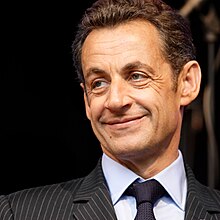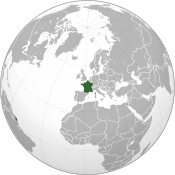Sarkozy's party defeated by Socialists in French regional elections
Monday, March 15, 2010

The Socialist Party took a strong lead in the first round of regional elections in France on Sunday. Its main opposition the Union for a Popular Movement (UMP), which is the governing party of incumbent President Nicolas Sarkozy, is predicted to be defeated. The election results, while marked by low turnout, strongly favored leftist candidates according to official returns. This has given the ruling right wing party a blow in the last nationwide election before the 2012 presidential elections.
When 96% of votes had been counted, candidates from the Socialist and other leftist parties had won 53.6 percent votes according to the Interior Ministry. The conservative UMP party and other right-wing candidates won 39.8 percent. The far-right National Front outdid expectations with 12% of the vote. It seems to be favored by voters concerned about immigration and the growing Muslim population. According to polls the Socialists will win with a majority in the second round in all 26 regions of France. The Socialists already control twenty of the twenty two regions on the French mainland.
Sarkozy has dismissed this result as “regional voting, regional consequences,” but indicated his intention to slow the pace of reforms and make a minor cabinet reshuffle. Prime Minister François Fillon said "It's not over. Everything is open" before the decisive runoff on March 21. He urged voters who missed the first round to come out for the second round, "at a moment when the economic and financial crisis demands sang-froid, courage and unity." Jean-François Copé, a leader of Sarkozy’s parliamentary group said “We had massive abstention — that is, an absolute record,”. Sarkozy supporters argued that the “triumphalism” of the leftists had been tempered by the record voter abstention, on television debates.

Image: Incorruptible.
Socialist leader Martine Aubry, in a speech to supporters Sunday night, called the result "encouraging". "By this vote the French people have sent a clear and strong message of refusal to a France that is divided, anguished and weakened," she said. She urged supporters to come out again next Sunday “to give a win to hope” that Sarkozy could be defeated in 2012.
Former Socialist Prime Minister Laurent Fabius called it "an excellent halftime for the Socialists," saying that voters wanted to voice their displeasure against Sarkozy's policies. He said the high rate of abstention indicated Sarkozy's failure to motivate citizens facing economic crisis and record unemployment. Ségolène Royal, expected to be Sarkozy's Socialist opponent in 2012 called this election "a severe sanction vote" against Sarkozy.

Image: David Monniaux.
The 81-year-old National Front leader, Jean-Marie Le Pen, said, "The National Front was declared beaten, dead, buried by the president. This shows that it is still a national force, and probably destined to become greater and greater". He appeared on national television after the vote, holding a poster banned by a court that reads: "No to Islamism." He called on voters to back the party again in round two, saying his party was "combative and capable of rebuilding this country, which is in a horrible state."
The National Front has tied for third-place nationally with Europe Écologie, the green-minded party campaigning about climate change, each winning 12 percent of the vote."Europe Écologie is the third political force," in France, said Daniel Cohn-Bendit, a leader of the party. It has frayed a "tremendous path," he said. His candidates are expected to align with the Socialists in many regions for the runoff polls.
Sarkozy had promised reforms to make the economy more dynamic before he was elected in 2007. But he changed this free-market strategy when the financial crisis hit and called for "moral capitalism" and proposed limiting bankers' bonuses and global regulation of hedge funds. Sarkozy's successful intervention to keep carmaker Renault from outsourcing jobs to Turkey and stimulus packages failed to lower the 10% unemployment rate inviting anger of the French citizens and causing his approval rating to fall below 40 percent. He was not able to stop the numerous strikes and protests by factory workers in recent months. He also started the 'Burqa' debate on the basis of which the far-right National Front has succeeded.
Turnout was estimated to be around 48 percent of France's 44 million eligible voters, a sharp drop from the roughly 60 percent who voted in 2004.
Sources
- Angela Charlton. "Sarkozy's party humbled by leftists in French vote" — Associated Press, March 15, 2010
- "Sarkozy's right-wing UMP facing election defeat" — BBC News Online, March 15, 2010
- Steven Erlanger And Katrin Bennhold. "Socialists Lead in Early Voting in France" — The New York Times, March 14, 2010

